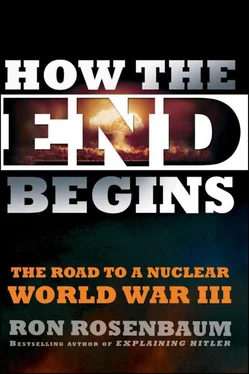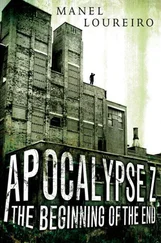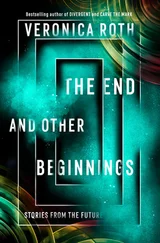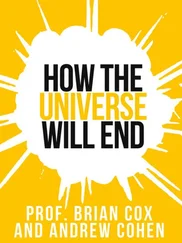One group of Israeli and American nuclear strategists led by Louis René Beres of Purdue, who had formed Project Daniel, [243]a kind of informal extra-governmental Team B for reassessing Israeli nuclear strategy, issued a report in 2007 that argued it was time to end Israeli nuclear ambiguity, that “bringing the bomb out of the basement” would enhance deterrence. Their argument was that declaring Israel’s nuclear capacity would remind the populations of the hostile states surrounding Israel of the consequences of rash acts by their leaders.
Halbertal had what I thought was an important refinement, a middle ground between opacity and full disclosure.
“I think what should be known is that there is a submarine [nuclear] capacity. Because then they know that we will retaliate. I think the problem is they might be tempted to think that nobody will survive to retaliate.”
Notice that he says it’s important “they know that we will retaliate,” even though he opposes retaliation. He seems to be saying, “it’s going to happen whether I like it or not.” It’s almost a fatalistic admission that it will. A feeling similar to the one I have about the U.S. Those missile crewmen will turn the keys.
“I would allow for the preemptive nuclear attack aimed at the capacity for a state to form a nuclear attack, while being also against retaliatory attacks because I don’t see much point. Though this should be secret.”
“This should be secret”—the esoteric strategy of nonretaliation. One he does not say exists but one he favors. It seemed to me his views would make news. I feel it is news: Leading Israeli military ethics adviser calls for disclosure of nuclear capacity. Defends preemption. Opposes retaliation.
Again: should this be talked about? I’m conflicted. But I feel the case against retaliation has not been discussed openly enough. That the case against retaliation has not been made precisely because of the argument that it must be kept secret, “esoteric,” which has lulled some people into a belief that it’s not going to happen, an attack, then a choice. But it is going to happen, an attack, then a choice. A choice to retaliate or not. I’m in favor of bringing whatever is esoteric out into the open in a case like this.
I asked him if the fact that a nuclear attack on Israel, the one or two bombs that would be necessary for the destruction of Israel, would represent a second Holocaust affected the threshold. Meaning crossing the bright line to nuclear use. He had previously discussed the threshold across which one is in “Supreme Emergency” territory and the ordinary just war restrictions don’t apply.
“Yes. Sure,” he says without hesitation.
“The decision about the threshold is affected [by the secondness of a second Holocaust]? Should the threshold be more clearly defined?”
“Yes. I don’t think we can only think about it in the abstract. It means a particular commitment to Israel growing out of its history, facing a sworn enemy that is using and abusing the Holocaust in a very complex way. [He’s referring to Holocaust denial by would-be Holocaust perpetrators in Iran who use the denial as strategic weapon, an excuse to perpetrate a Holocaust.] Yes, it factors in. And it’s not merely emotional, I can see the moral weight.”
“It [that secondness] becomes a strategic fact?”
“Yes.”
“When it comes down to the decision: has the threshold been crossed…”
He speaks about past instances in which nuclear use by Israel has been contemplated. “I would be very, very careful with this threshold,” he says, “Very careful. Here is another scenario. This was quite real in 1973. [244]Moshe Dayan had big doubts about what should be played out in 1973. [The Yom Kippur War in October of that year, which began with an Egyptian surprise attack that along with a Syrian attack from the north seemed about to overwhelm the state of Israel.] At least in the eyes of Moshe Dyan, you know and others in the military and political leadership of Israel, there was a feeling that we are on the verge of collapse. The first few days. Now let’s say that you are on the verge of collapse and you know the Syrian forces are already entering the Galilee and soon taking Haifa. Can you, at last resort, use a nuclear bomb?”
Last resort here—in the 1973 example—means a situation in which the nuclear decision is not one of preemption (too late) or pure retaliation (too soon), but one made in the fog of war, one that crosses the nuclear threshold in the heat of battle, not an opening but a closing act. He is discussing what others, most recently Benny Morris, have reported as well about the opening days of the 1973 war, an actual moment of nuclear decision, much closer than we came in Cuba.
“This [use of a bomb when in peril of national collapse from conventional war] is clearly ‘first use’ if not technically preemptive,” Halbertal says. “It’s preempting being completely destroyed, but the preemptive level of the threshold is clearly serious because now we have lost our capacity to defend ourselves.
“And the question is whether it’s justified. Now what we are speaking of here is not really preemption of nuclear attack. But preemption against loss of independence. Loss of the state. If not loss of existence itself, then a homeless people again, perhaps vulnerable to slaughter again.” What a choice.
“An existential threat,” I interposed.
“Right, to the state, to the Zionist project, etc. etc. etc. And I read somewhere that Dayan gave the order to be ready with them [the nukes]. Whether that was the case or not there is a dispute. But it’s a dilemma, a real dilemma.”
He was speaking about then but he was of course speaking about now as well. A real dilemma, no good answer. No good choices.
Halbertal became particularly eloquent when I asked him the “species” question that Ellsberg had raised. Is there something fatally flawed in human nature that brought us to this point? A question I had asked scholars of Hitler and the Holocaust: “Do you wonder about the nature of human nature when you contemplate these kind of questions?” I asked him. His answer was both memorable and tragic.
“I think, you know, I didn’t realize what I always knew, but it’s become more clear: that humans are capable of the best and the worst, and the gap within humanity is so big. I mean I’m not—I didn’t turn cynical, because I see cases of goodwill and piety and altruistic sentiment that are so genuine, and then you know, just to see manifestations of radical evil.
“And then what I learn is, I come back in that respect to the Jewish teaching that the options are open. There are very different options and choices that are open to human beings and what they should do and they can shape themselves in very different radically diametrically opposed directions, and that humans have a choice in how they do it. But when you confront the spectrum of humanity you understand the potential of freedom that exists, and human responsibility for what it makes out of itself.”
At the end of the interview I must admit I found myself feeling somewhat emotional. I had been searching throughout the course of this book for someone in a position of responsibility, or at least inside knowledge, to entertain the notion that I had fixated upon that nuclear retaliation was immoral. I thought his willingness to speak frankly was courageous, not least because he was likely to die in any nuclear exchange.
“It’s rare to find someone,” I found myself telling Halbertal, as I prepared to leave, “who takes the question of the morality of retaliation seriously. I’ve always thought that in focusing on this that I was an outlier or something like that, or beyond the pale, whatever, but retaliation never made any sense to me. On the other hand there is the paradox that one shouldn’t talk about the possibility of an esoteric morality because it invites an immoral attack.”
Читать дальше











